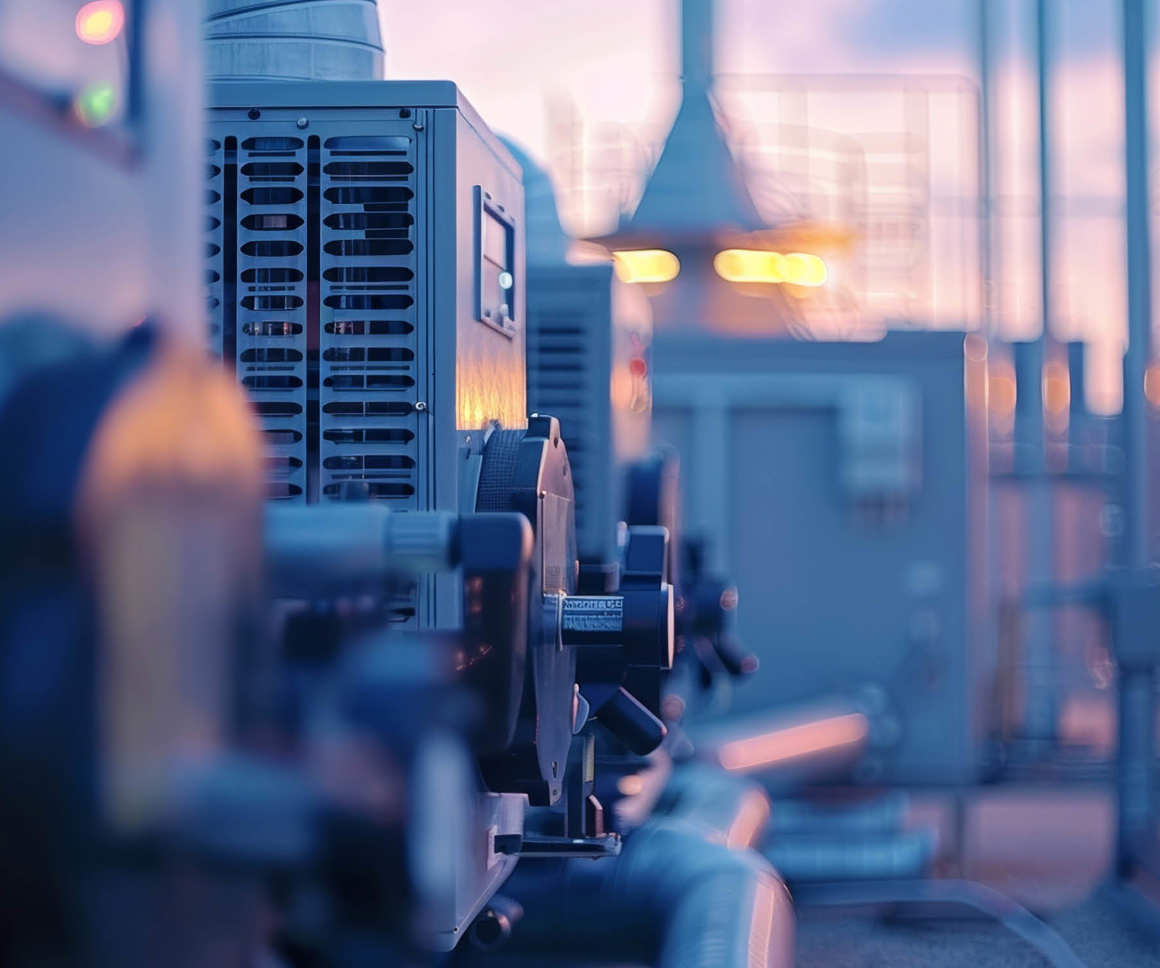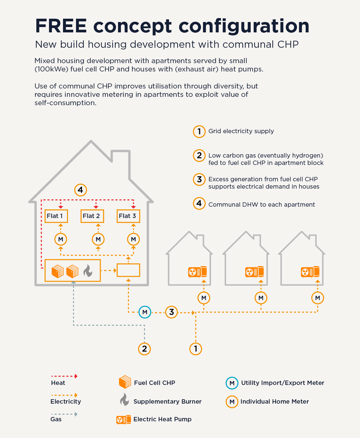The role of CHP systems in supporting resilient decarbonisation of domestic heat and transport
Energy transition Energy consultancy
As the UK accelerates toward net zero, electrification of heat and transport is at the forefront of the energy transition. Heat pumps and electric vehicles (EVs) are widely expected to dominate the solutions, but this shift brings enormous challenges: building sufficient generation capacity, matching supply and demand, and expanding grid infrastructure.
We, at LCP Delta, consider the potential for communal Combined Heat and Power (CHP) systems (particularly modular fuel cells) could play a targeted but impactful role in addressing these challenges. While traditional micro-CHP systems have so far failed to gain traction in the UK for domestic heating, communal CHP systems may offer a pathway to enhance grid resilience and support a flexible, low-carbon future.

An illustration of how a communal CHP system may be configured to provide heat and power to an apartment complex and support electrified demand in neighbouring houses.
Flexible use brings a double benefit to the energy system
Grid constraints are already slowing the pace of the energy transition, and this issue will only intensify as the adoption of heat pumps and EVs accelerates. CHP fuel cells could help alleviate these constraints in two ways:
- Reducing new grid stress: By displacing heat demand that would otherwise rely on electricity and providing power for new electric demands, such as EV charging.
- Flexible power generation: When paired storage solutions, e.g. thermal or battery, fuel cells can generate electricity during peak demand periods, helping to relieve existing grid constraints and mitigate the need for distributing electricity over the network.
Newer energy-efficient buildings further enable this flexibility. With lower heating needs, most heating demand consists of water heating, which can be provided at any time of day when paired with water storage. This reduces reliance on ancillary gas boilers and improves the overall carbon-intensity of the CHP system.
But what about net zero?
The use of natural gas in fuel cells is not compatible with net zero in the long-term. However, the potential for conversion to hydrogen offers a viable pathway. Fuel cells are inherently hydrogen-ready, requiring only a reformer to adapt to natural gas use. The question of whether fuel cells can accelerate the transition to net zero depends on several factors:
- Grid constraints: How effectively can fuel cells support new connections for electrified heat and transport that otherwise would not be possible due to grid constraints?
- Hydrogen availability: Can cost-effective hydrogen or other low-carbon gas sources be delivered to these systems in time to meet net zero goals?
Unabated natural gas is expected to remain part of the UK’s energy mix through to 2050, with LCP Delta’s forecasts estimating 42 GW of unabated gas generation capacity in 2030, dropping to 18 GW in 2050. Compared to this generation, fuel cells can be cleaner per unit of utilised energy when waste heat is captured. However, their decarbonisation impact ultimately depends on when and how they are used, alongside broader trends in grid emissions.
Community benefits
Communal CHP systems offer several advantages over individual household solutions:
- Economies of scale: Larger, shared systems reduce costs and improve efficiency.
- District heating synergy: Communal systems align with the UK government’s target of 15-18% of domestic through district heating by 2050. These heating zones are also likely candidates for early hydrogen development, particularly near industrial parks.
- Energy sharing and Home Energy Management (HEMs): Community energy sharing schemes can lower energy bills and optimise large loads, such as EV charging.
- Resilience in outages: With microgrid infrastructure, these CHP systems can also continue to supply power locally during wider network outages, offering increased flexibility.
Shaping the energy transition with LCP Delta
At LCP Delta, we are actively exploring the role of communal CHP through the Ofgem Strategic Innovation Fund (SIF) Alpha phase FREE (Fuel-cell Renewable Energy Equity) project. Led by Northern Powergrid with partners including Northern Gas Networks, Bosch, E.ON, the University of Strathclyde, Fifty5north, and EA Technology, this project investigates how the communal CHP systems could deliver real-world benefits.
LCP Delta leads four of the six work packages, focussing on:
- Characterising costs and benefits.
- Developing the business models.
- Engaging stakeholders from policy and regulation, networks and local energy system development and operation.
If you have insights to share or are interested in participating in future trials, we’d love to hear from you.
Let's talkYour questions answered
Subscribe to our thinking
Get relevant insights, leading perspectives and event invitations delivered right to your inbox.
Get started to select your preferences.





